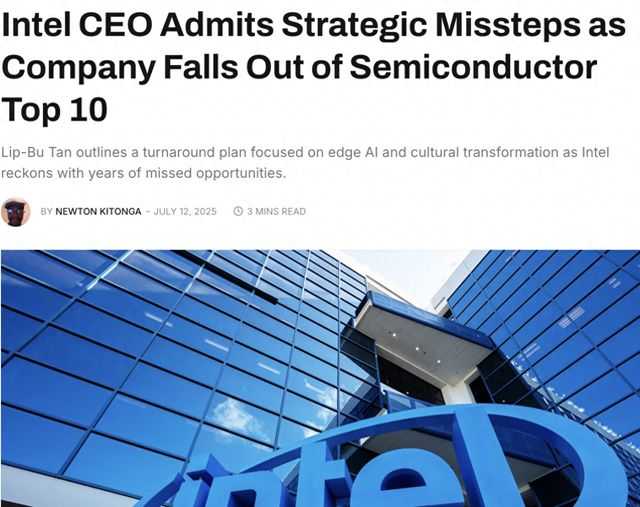
Intel CEO Lip-Bu Tan publicly acknowledged in a recent internal meeting that the company has fallen out of the global top 10 semiconductor firms due to years of strategic missteps, revealing a staggering $16.6 billion loss in Q3 2024 . This marks the worst quarterly performance in Intel’s 57-year history, driven by $15.9 billion in accelerated depreciation costs tied to underperforming Intel 7 manufacturing assets and Mobileye’s goodwill impairment . To reverse its fortunes, the board approved a new strategy centered on edge AI and agent AI, coupled with global layoffs and business restructuri
Tan identified the pivotal moment when Intel declined to supply chips for the original iPhone, allowing ARM and Qualcomm to dominate the mobile market. Recent setbacks include underwhelming x86 hybrid architectures, lukewarm reception for the Arrow Lake processor, and disappointing GPU performance, forcing Intel to outsource approximately 30% of its wafer production to TSMC—a figure projected to stabilize at 15-20% long-term . The company’s manufacturing delays even led to its flagship Nova Lake CPU being produced by TSMC’s 2nm process .
Beyond technical shifts, Tan emphasized the need to overhaul Intel’s corporate culture, slashing management layers from eight to five and mandating a four-day in-office workweek to foster collaboration . These measures aim to address systemic issues like bureaucratic inefficiency and delayed decision-making. The restructuring also involves divesting non-core assets, such as selling a 51% stake in Altera and pausing German/Polish fab projects to focus on U.S. manufacturing .
The transformation comes amid a critical industry landscape: the global semiconductor market is projected to reach $700.9 billion in 2025, with AI chips accounting for over $150 billion . However, Intel faces intense competition, as NVIDIA now commands 92% of the discrete GPU market while AMD holds 8%—Intel’s share has plummeted to 0% . Its foundry business, once a cornerstone of its turnaround plan, now captures just 0.9% of the market, dwarfed by TSMC’s 61% .
With 21,800 jobs cut since 2024—representing 20% of its workforce—and $10 billion in cost reductions underway, Intel’s survival hinges on executing its AI-centric strategy . Analysts warn that while edge AI and agent AI offer growth potential, Intel must prove it can deliver competitive products at scale to regain relevance in an industry it once dominated.





